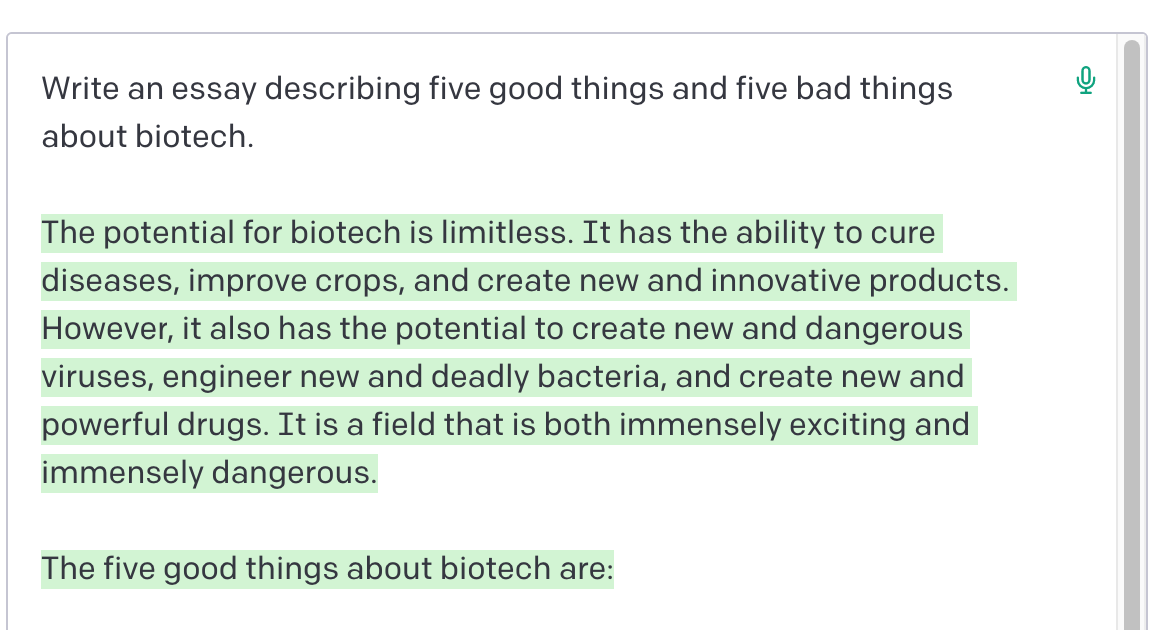Students are acing their homework by turning in machine-generated essays. Good.
Teachers adapted to the calculator. They can certainly adapt to language models.
The latest AI-related alarm: students around the world are using AI models such as GPT-3 to write essays, and getting good grades on them.
I don’t condone cheating. But I think the availability of text generators will force changes to education which, while painful, will prove to be positive.
Consider the threat once posed by the calculator to homework that involved arithmetic. In some cases, the point of such exercises is to learn arithmetic or mathematical principles through practice. Teachers mostly shifted those exercises to the classroom, and prohibited the use of calculators in that setting.
In other cases, homework involved tedious arithmetic, but this was entirely incidental to the learning goals of the exercise (which might be about, say, gravity). After initial reluctance, teachers recognized that it was pointless to make students do these manually. Back when I was in high school, we were forced to use log tables out of the mistaken belief that there is pedagogical value in doing tedious calculations by hand. Mercifully, log tables have now joined the abacus.
The same changes are likely to play out with language models. In some cases, the point of assigning an essay is to teach writing skills or critical thinking. The availability of language models has not obviated these skills. To prevent cheating on this type of exercise, instructors could move them to the classroom. Even better: there are many ways to change the exercise so that the tools aren’t helpful. These changes take advantage of inherent limitations of language models that are unlikely to be fixed soon.
In other cases, essays are pure tedium. In fact, it seems to be this kind of essay where language models are doing particularly well, with assignments such as “Write five good and bad things about biotech”. As an educator, I think this assignment is close to useless if the goal is to learn about biotech. Nor does it teach critical thinking. It’s the equivalent of the log-table drudgery I once faced. If these types of essays are no longer viable, good riddance.
The adjustment will be painful, for sure. The reason instructors assign mind-numbing essays isn’t callousness or incompetence. It’s usually because teachers and adjunct professors are underpaid and overworked, and it’s far easier to ask for “five good and five bad things” rather than to design a question that requires reasoning and fosters learning. And the more tedious the essay, the easier to grade, because it’s enough to scan for keywords.
These are deep and long-standing problems with our educational system. AI tools didn’t create them and banning their use by students won’t solve them.
Update: In the comments, Professor Timothy Burke points to the book Why They Can't Write: Killing the Five-Paragraph Essay and Other Necessities exploring the widespread pedagogical misuse of writing for teaching subject matter (as opposed to writing skills and critical thinking), as well as his own analysis of the issue.




I completely agree. Essays have been reduced to nothing more than mindless busy work. The existence of chat-GPT now forces teachers to come up with better formative and summative assignments. For instance teachers can have students read a novel, have them create a creative piece to show understanding, and than instruct students to write a short essay expressing their overall experience of the process. In this scenario, if students choose to use chat-GPT, it will most likely be used more as an assistant rather than a full on cheating tool.
Calculators spawned several generations of people who still can't make change without their electronic device. Cellphones spawned several generations of people who can't read a map or spell. Okay, those skills may be unnecessary now. But as long as writing ability remains the single most important skill for a career in science, having an AI write your essays is a big mistake. Essay assignments in English should be like, "Write an essay of at least N words on a subject that matters to you." If you must dictate a topic, just point out that the grade will depend on relevance to the most recent course material. Writing is not an exercise; it's self-discovery!